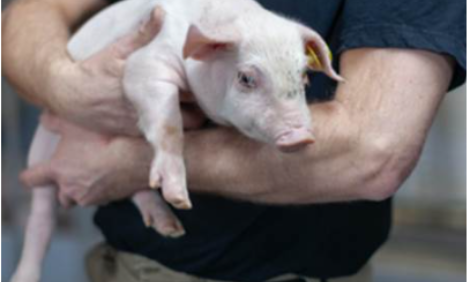



Effects of Inadequate Maternal Dietary Protein:Carbohydrate Ratios during Pregnancy on Offspring Immunity in Pigs
An imbalance of protein or carbohydrate to gilts during pregnancy induced both short-term and long-lasting effects on immune responses in piglets, and may impair the defences of their piglets against potential pathogens, according to new research from Germany.Inadequate nutrition in utero may retard foetal growth and alter physiological development of offspring, according to Margret Tuchscherer and co-authors at the Leibniz Institute for Farm Animal Biology (FBN) in Dummerstorf, Germany.
Their study, reported in BMC Veterinary Research, investigated the effects of low and high protein diets fed to primiparous German Landrace sows throughout pregnancy on the immune function of their offspring at different ages.
Sows were fed diets with adequate (AP, 12.1 per cent; n=13), low (LP, 6.5 per cent; n=15) or high (HP, 30 per cent; n=14) protein content, made isoenergetic by varying carbohydrate levels. Cortisol, total protein and immunoglobulin (IgG, IgM, IgA) concentrations were measured in the blood of sows over the course of pregnancy. Cortisol, total protein, immunoglobulins, lymphocyte proliferation, immune cell counts, and cytokines were assessed in the blood of offspring at baseline and under challenging conditions (weaning; lipopolysaccharide (LPS) administration).
In sows, the LP diet increased cortisol (P<0.05) and decreased protein levels (P<0.01) at the end of pregnancy.
Immunoglobulin concentrations were decreased in LP (IgA) and HP piglets (IgG, IgM and IgA) on the first day of life (P<0.05), whereas the number of lymphocytes and mitogen-induced lymphocyte proliferation of the piglets were unaffected by the maternal diet.
Mortality during the suckling period was higher in LP piglets than with AP and HP offspring (P<0.01). Furthermore, LP piglets showed an elevated cortisol response to weaning, and in HP piglets, the CD4+ cell percentage and the CD4+/CD8+ ratio increased after weaning (P<0.05).
The lipopolysaccharide-induced rise of IL-6 was higher in LP (P=0.09) and HP (P<0.01) than in AP piglets, and LP piglets displayed higher IL-10 levels than AP piglets (P<0.05).
Tuchscherer and colleagues concluded their results indicate that both low and high protein:carbohydrate ratios in the diet of pregnant sows can induce short-term as well as long-lasting effects on immune competence in piglets that may have serious consequences for host defence against bacterial pathogens.
Reference
Tuchscherer M., W. Otten, E. Kanitz, M. Gräbner1, A. Tuchscherer, O. Bellmann, C. Rehfeldt and C.C. Metges. 2012. Effects of inadequate maternal dietary protein:carbohydrate ratios during pregnancy on offspring immunity in pigs. BMC Veterinary Research, 8:232. doi:10.1186/1746-6148-8-232
Further ReadingYou can view the full report by clicking here. |
January 2013








